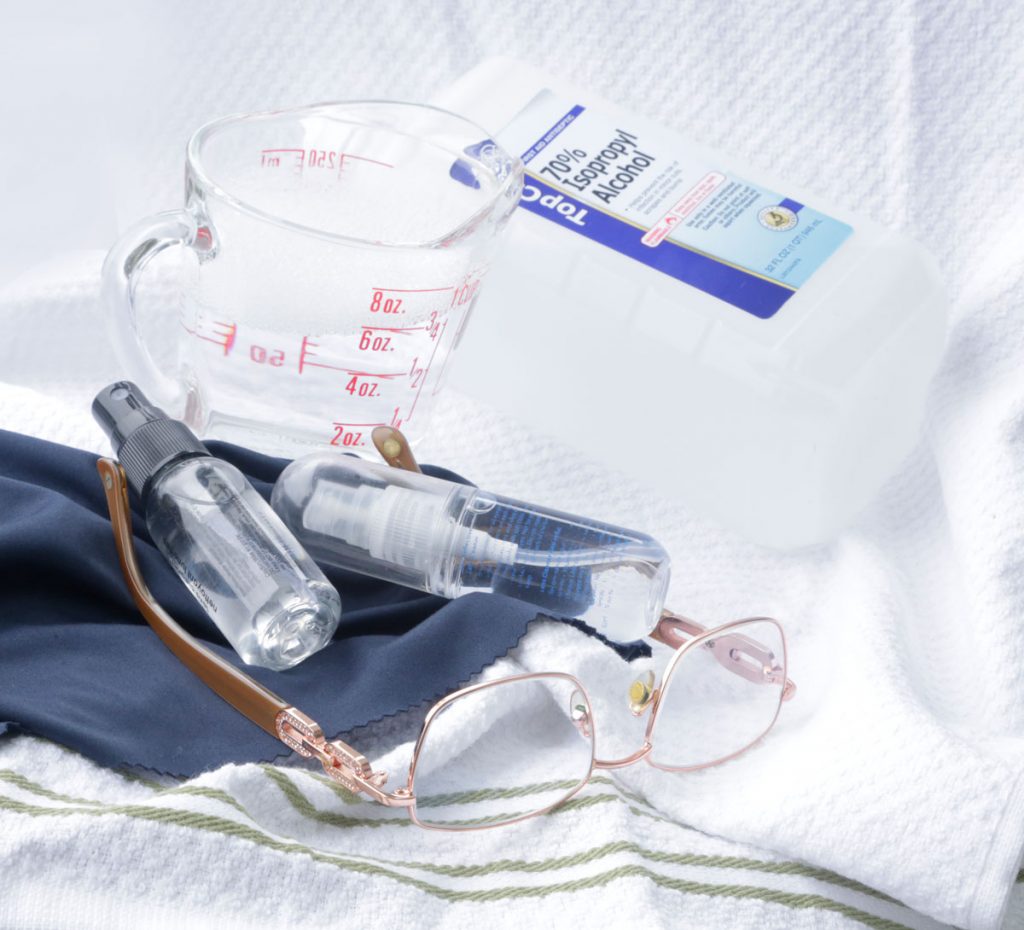Have you ever wondered how to keep your glasses sparkling clean? Have you tried some solutions and found they leave a greasy film? To keep your glasses clear means, you need to use several methods over time. Here are a few suggestions.

Here’s a list of cleaning methods for your eyeglass lenses.
- Store-bought liquid eyeglass cleaners
- A spray bottle of half water, half white vinegar, and one drop of dish soap.
- A spray bottle of 70% Isopropyl Alcohol, aka Rubbing Alcohol (or 3/4 rubbing alcohol and 1/4 water)
- Special lens cleaning wipes
- Plain dish soap and warm water rinsed under the tap.
- A cloth specially made for lenses so it won’t scratch or take the special coating off of your glasses. (After several washings, you may have to purchase new ones)
- Occasionally, a hair dryer is used to dry the glasses.
Why having all these things on hand will help keep your glasses clear.
I am sure, like me, you have been frustrated at times when your eyeglasses seem to be smudged or foggy even though you clean them the same way. That is why I have found that using different methods intermittently helps over time.
My eyeglasses have been smudged just one too many times. Since I work on my laptop most days, this can be unpleasant. I have store-bought and homemade cleaning solutions plus soft lens cleaning rags ready at my desk. Sometimes, though, this is not enough, and I have to resort to my list, starting with soap and water.
How I clean my eyeglass lenses.
I make sure I have freshly washed, clean lens cleaning cloths. Yes, I ensure that I have several, and after using them all up, I launder them. I use a solution of half vinegar and dish soap. I soak the unique rags very well and then rinse them, making sure my hands are clean and free of oils. Then, I hang them on a plastic hangar and let them air dry. Sometimes, I’ve laundered them with other fine clothing in a washing machine and dried them in the drier. But given the time I have available, I find the first method works best.
I store these lens cloths in a zip-lock bag so they don’t pick up any grit. It is good to take precautions when washing, storing, using, etc., so the lens cloths don’t pick up dust or grit that could harm your lenses.
I also keep a fresh packet of lens-cleaning wipes in my purse so that when I am out, I never have to resort to tissues that might scratch them.
First step:
- Wash eyeglasses and frames with a few drops of dish soap under warm water from your tap. This removes oils from daily use from the lenses and frames, which you pick up and subsequently risk smearing. Air dry the glasses using a hair dryer. Some tiny droplets may still be there, so rather than drying them so they mark your lenses, get one of your clean lens cloths and wipe them dry. This method usually works every time.
- Use a commercial lens cleaner and wipe dry. These sometimes cause streaks; I’ve tried several brands. But they are good to have in a pinch.
- The next method is to use a spray bottle containing vinegar, water, and a drop of soap. This works well for a while.
- Most often, I use a tiny spray bottle of 70% Isopropyl Alcohol, aka Rubbing Alcohol. This seems to work most of the time.
Isopropyl Alcohol eyeglass cleaner.
- 70% Isopropyl Alcohol, aka Rubbing Alcohol, in a small spray bottle. (or a blend of water and rubbing alcohol)
- Use this anytime to freshen up your eyeglasses.
- Let the alcohol evaporate completely before using your glasses; it takes only 60 seconds.
You can also use the spray bottle of pure rubbing alcohol and a soft cloth or tissue to clean smudges off your cell phone screen. Remember: Isopropyl Alcohol is a volatile, flammable liquid with a clear and colorless appearance. It has a pungent odor and produces vapors due to its fast-drying properties.
Make sure to use Isopropyl Alcohol safely
- Be sure to use these safety tips.
- Do not use Isopropyl Alcohol on deep wounds.
- Do not ingest or apply it to organs or openings in the body’s lower extremities.
- Not to be taken internally. Do not ingest rubbing alcohol.
- Since Isopropyl Alcohol is sold mostly in larger containers, you must pour it to mix or use it. Therefore, to eliminate the risk of ingesting it, do not handle it in the kitchen or near any food sources. The best place for handling is in the laundry room or bathroom.



